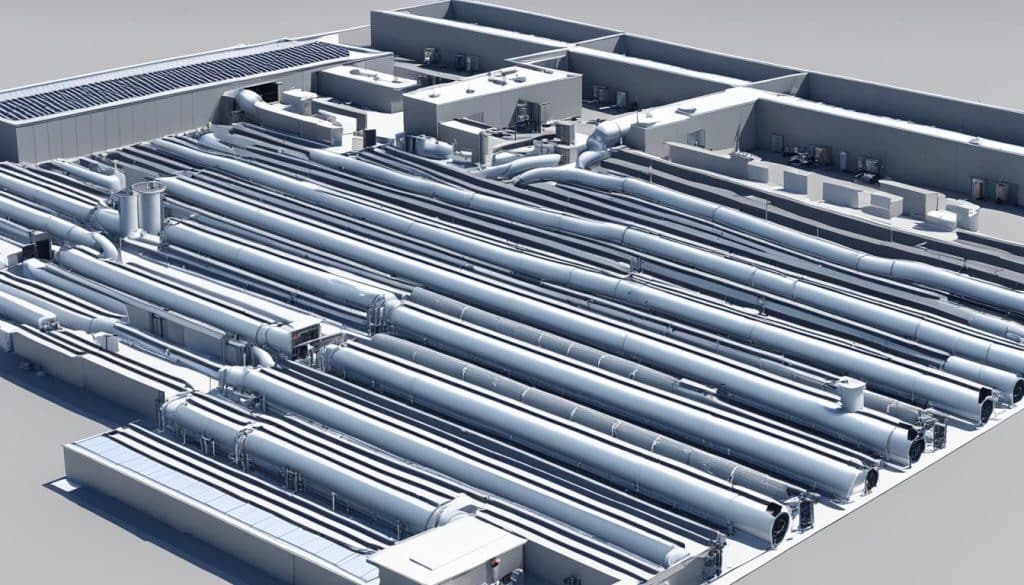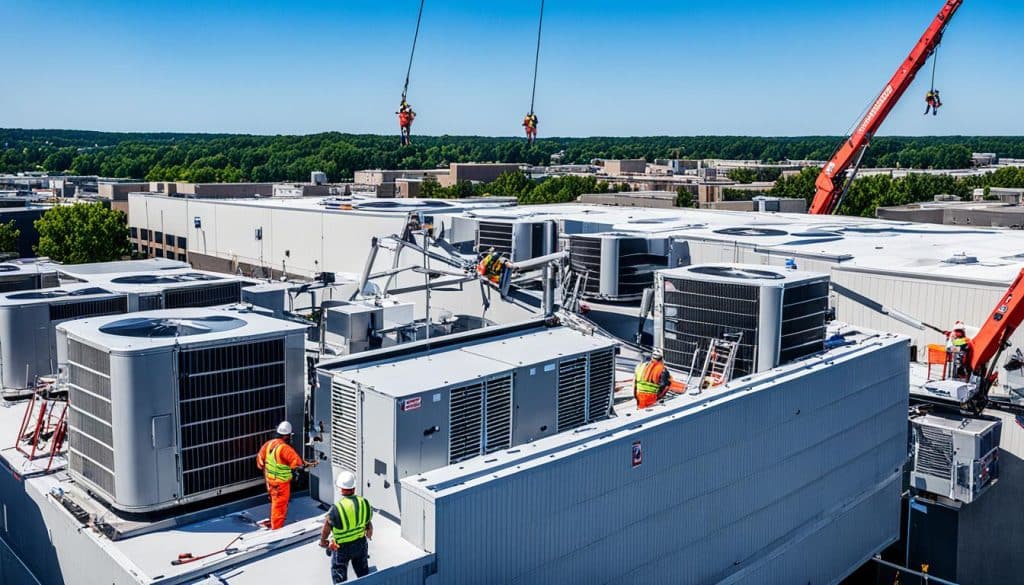Ever wonder why some places are always comfy, while others make you too hot or cold? It’s all about expert Commercial HVAC Installation: Expert Solutions. These systems are key to keeping our workplaces, schools, and malls comfortable and clean.
Platinum Heating & Cooling – Commercial HVAC systems are vital for controlling the climate in big buildings. They work hard in offices and factories to keep people comfortable and focused. HVAC experts are key in making and setting up these systems to fit each place’s needs.
Installing commercial HVAC systems is a big job that needs a lot of knowledge. It’s about understanding how buildings work, saving energy, and using the latest technology. As companies aim for more eco-friendly ways and lower bills, the need for skilled HVAC help keeps growing.
Key Takeaways
- Commercial HVAC systems are key for comfort in big buildings
- Getting it right from the start is important for efficiency and lasting performance
- HVAC pros are experts in creating custom solutions
- Good installation affects energy bills and air quality
- Commercial systems are much different from those for homes
- Keeping up with maintenance is crucial for the best performance
Table of Contents
Understanding Commercial HVAC Installation
Commercial HVAC systems are key to keeping businesses comfortable. They come in many types and sizes to fit different spaces. This ensures they meet the unique needs of various commercial areas.
Types of Commercial HVAC Systems
There are several types of commercial HVAC systems, like split systems, heat pumps, and packaged air conditioners. Each type has its own benefits for different buildings and climates. Choosing the right one is important, and HVAC installation services can help with that.
Key Components of Commercial HVAC
At the heart of commercial HVAC systems are compressors, condensers, and evaporators. These parts work together to control temperature and air quality. Knowing about them is key for keeping the system running well.
Energy Efficiency Considerations
More businesses are now looking at energy-efficient HVAC systems. Features like economizers and the right size can cut down on energy use and costs. By picking an energy-efficient system, businesses can reduce their environmental impact and save money on bills.
The Importance of Professional Commercial HVAC Installation
For businesses, getting a professional HVAC installation is key to top-notch system performance and saving energy. Experts in commercial HVAC design make sure your system fits your building and meets industry standards.
Skilled teams manage every step of the installation. They handle engineering, LEED™ project advice, and energy cost analysis. This full approach stops problems like refrigerant leaks and short cycling. These issues can cause expensive repairs and downtime.
Installers know how to work on different projects like plan and spec, design/build, and tenant finish. They understand building codes well. This means your HVAC system will follow local laws, avoiding legal trouble and fines.
Choosing professional commercial HVAC installation is a smart move. It means better air quality, more control over temperatures, and lower energy bills. With experts on your side, your business will run smoothly and efficiently for years.
Commercial HVAC Installation Process
Installing commercial HVAC equipment needs careful planning and expert skills. Managing the project is key for a smooth setup. Let’s look at the main steps in commercial HVAC installation.
A top goal for Platinum Heating & Cooling is to make HVAC systems efficient and reliable. They use the newest technologies and best practices in the industry. This includes energy-saving features that help businesses cut costs and keep comfortable. If you need commercial HVAC services, call Platinum Heating & Cooling at (616) 229-0444. Or email them at office@platinumheatingmi.com. Count on their skills and history to maintain your HVAC systems in top shape.
Site Assessment and Planning
First, a detailed site check is done. It looks at the building’s layout, current setup, and heating and cooling needs. Experts then make a plan with timelines, resources, and possible issues.
Equipment Selection and Sizing
Choosing the right HVAC equipment is crucial for good performance. The size of the building, how many people use it, and energy goals are considered. Experts use special software to figure out the exact size needed, making sure it fits the building without wasting money.
Installation and Integration
Next, the new HVAC system is installed. This means putting in indoor and outdoor units, setting up ducts, and connecting to electrical and plumbing systems. Skilled workers make sure the new system works well with the building, causing little disruption.
Testing and Commissioning
After installing, thorough testing and commissioning happen. This ensures the HVAC system works right and meets standards. Workers adjust the system, check safety, and teach building managers how to use and maintain it.
Choosing the Right HVAC System for Your Commercial Space
Choosing the right commercial HVAC system is key for your business. It ensures comfort, saves energy, and cuts costs over time. Think about what your space needs when looking at HVAC installation services.
The size of your HVAC system is important. A system too small won’t keep your space comfortable. A system too big wastes energy. Experts can find the right size for your building’s size, how many people use it, and its use.
The climate affects your HVAC choice. Different places need different heating and cooling. In mild climates, efficient systems like heat pumps or geothermal might work best. In extreme weather, you might need stronger systems.
Think about your budget for installation and running costs. Even though efficient HVACs cost more at first, they save money later. Consider maintenance and energy rebates too.
Also, consider what your business needs. Some places need zoned systems for separate area control. Others might need special air filters or humidity control. Talk to HVAC experts to find the best fit for your space.
Common Challenges in Commercial HVAC Installation
Installing HVAC systems in commercial spaces can be tough. It comes with unique challenges. HVAC pros face many hurdles when setting up these systems.
Space Constraints
One big challenge is finding enough space. Older buildings and busy cities often don’t have room for new equipment. Contractors must find ways to fit everything in without losing performance.
Building Code Compliance
It’s vital to follow local building codes for HVAC installations. These rules vary a lot by city and state. Skilled contractors keep up with these changes to make sure installations are up to standard.
Integration with Existing Systems
Adding new HVAC parts to old systems can be hard, especially during renovations. Experienced contractors know how to make new tech work with the old setup. This is crucial to avoid problems like air leaks or clogged filters, which could cause expensive repairs later.


